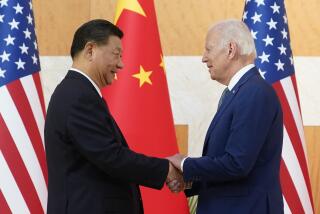Put Clinton’s Show on the Road
- Share via
Travel becomes this man. Absent solid general principles to guide foreign policy, President Clinton should lean heavily on his natural instincts for engagement. Going places and engaging in dialogue is Clintonesque--just as stifling the conversation is unnatural for him. His advisors need to understand what this Arkansas-bred politician has to offer the world and do a better job of playing to his strengths.
Three potentially explosive “visitation” issues could show America’s president at his best if he can avoid the bad advice he’s getting.
First, there’s the issue of how Clinton should behave during his state visit to China next month. He would be wise to ignore the counsel of some influential East Coast newspaper columnists that he avoid appearing at Tiananmen Square. Planting his feet there, one pundit opined, would be a “craven concession” to Beijing, “a violation of the principle that America should hold fast to its ideals.” Another press potentate envisions the scene as instantly contradicting “those of us who believed this presidency would not plumb new depths in its continuing moral decline.” That’s good reading but bad advice, unless Clinton wants to call off the whole trip.
Established Chinese diplomatic practice, when the weather allows, is to welcome visiting heads of state at Tiananmen--not, say, in front of the golden arches adorning the nearby McDonald’s, which is of course one of America’s great contributions to Chinese civilization. Americans know the vast and open area of Tiananmen only by the stomach-turning scene of the 1989 brutal repression of protesters. But for the Chinese, Tiananmen is also the time-honored ceremonial platform bracketed on one side by the Great Hall of the People (into which ceremonies retreat during inclement weather). Since 1989, every significant foreign head of state visiting China has been welcomed at Tiananmen or the Great Hall. Since Chinese authorities would find it very difficult to accept a face-slapping departure from diplomatic custom, Clinton shouldn’t raise the issue unless he wants to risk jettisoning the visit altogether. And China’s leaders should leave the ordinarily diplomatic Clinton alone to say whatever he wants at Tiananmen.
More than ever, this trip is a must. After India’s nuclear testing last week, the world needs China not to restart its own testing, just as it needs India to retreat from its dangerous path. So just as Clinton is right to engage China and raise this issue when he visits, he would be wrong to try to further punish India for the surprise nuclear tests by canceling his planned trip there this fall. That would only compound New Delhi’s paranoia about Washington tilting toward Beijing, which in 1962 clobbered the Indian army in a fierce border war. The world’s largest democracy must not be left out in the cold. For more than two decades, India has neither tested nor deployed nuclear weapons. Nor has it transferred sensitive nuclear technology to others--unlike China, the world’s largest autocracy or, for that matter, America, the world’s most confused superpower.
Until last week, Indian policy since 1974, when it previously tested the bomb, had been Gandhian peaceful. Neighboring China has built up its own program and helped India’s blood enemy Pakistan enter the nuclear age. As scholars Deepa Ollapally and Raja Ramanna wrote before last week’s regrettable Indian about-face: “Given that military planners assess capabilities rather than intentions when making strategic choices, India’s restraint could be viewed as exceptional.” No longer. For China, however, it’s a fabulous opportunity to look great--and to make Clinton look like a champ--if during the visit Beijing were to make a big show of refraining from any more testing and somehow induce Pakistan not to test its own nukes. And, while Beijing is at it, it could lean on North Korea not to get back on the nuclear road.
Clinton’s third essential engagement is Japan, the Asian nation most to worry about. To date, its bomb-averse stand makes it the one country with true moral standing on the nuclear issue; after all, it is the only country whose people actually had these abominations dropped on their heads. But can Japan continue to ignore Asian militarization if China responds to India by resuming testing? (And then, what would technologically capable but tiny Taiwan start plotting to do? Like Israel, which has the bomb, Taiwan could easily enter the game.) And what if stormy North Korea does walk the nuclear plank?
All of this uncertainty makes it vital that Clinton show Japan respect by honoring its unspoken request to stop off, however briefly, on the way back from China.
Clinton is at his foreign policy best when he shows his face, with the kind of engaging presence that helps others save face. By contrast, stagy, melodramatic demonstrations of principle, whether over Tiananmen or India, just are not in the genetic coding of this president. Face-to-face engagement is his strong suit. And he’ll need all of that and more in China, Japan and India during this mushrooming re-proliferation crisis.
Times columnist Tom Plate teaches at UCLA’s communication and policy studies programs. E-mail: tplate@ucla.edu
More to Read
Sign up for The Wild
We’ll help you find the best places to hike, bike and run, as well as the perfect silent spots for meditation and yoga.
You may occasionally receive promotional content from the Los Angeles Times.






